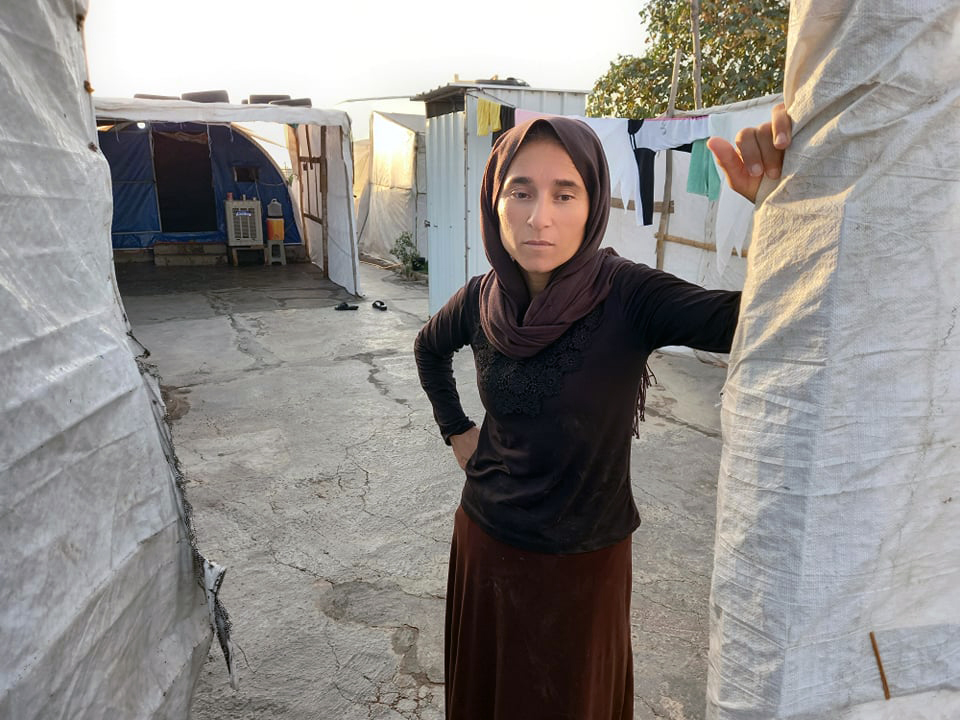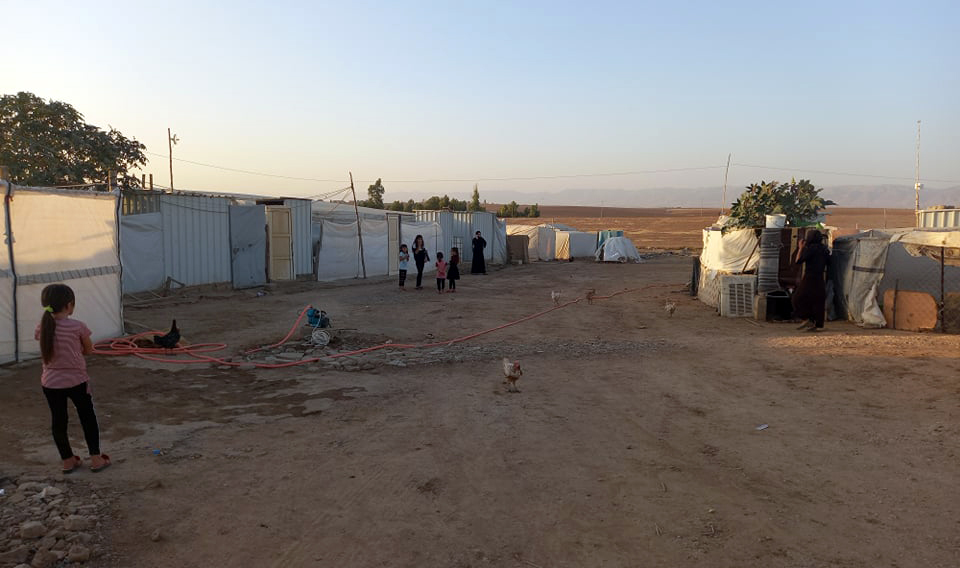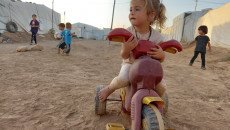Her grieves are a series, one following the other, from slavery under ISIS into life under a shabby tent near an IDP camp. She is the symbol for seven years of bitterness.
From the facial expression of Basy Darbo, 31, man can tell how hard she suffered. Her feeble body is a sign how her agony is overcoming her. She looks exhausted.
When the extremist militants of the Islamic State in Iraq and Syria ISIS storm Shingal, home to the Ezidi community, and take over large swathes of Iraq in 2014, she is enslaved.
She spends tough years at their hands. Once she is freed and rallies with family members, she cannot return to the war-torn hometown and decided to live under a temporary tent near a camp for the Internally Displaced People IDP.
Now it's almost three years and they are still living under the tent they thought would take days or maximum months. It is a dusty land close to the IDP camp of Khanly of Simel district of Duhok Northern Province.
Darbo and her neighbors use cheap thin aluminum boards to fence a small front yard for their tents. Their big dreams of returning to reconstructed home towns, freedom of the enslaved and reparation has turned only into getting a proper tent inside one of the IDP camps.
The camps are full of IDPs and those families based around and out of camps have to register in order to replace families voluntarily leaving either back to home or leaving the country forever.
"Most of the IDPs have passed through this but we as survivors of ISIS suffer twice because we passed through harsh conditions and return to a desperate life," Darbo who survived ISIS in 2019 told KirkukNow and reunited with her husband and kids in Duhok.
The father and the kids has not gone to any IDP camp as their eagerness to for the release of their mother and all the Eizids enslaved at the hands of IS militants have left them lost.
"What harm we did that we deserve not receiving a tent in a camp? True tent is tent but people in camps receive monthly aid," Darbo sobbed.
Tens of thousands of Ezidis are still living in 26 of camps for IDPs in Kurdistan region despite liberation of their territories from ISIS in 2017 due to the vast destruction to their hometowns and public utilities.
The Joint coordination Center JCC of Kurdistan Regional Government KRG says 84,000 IDPs live out of the IDP camps and 34,000 in the IDP camps.
Ezidis are an ethno-religious minority over half a million people, mostly residing in Shingal district of Ninewa province. The militants of ISIS in 2014 attacked their communities, killing thousands of men and taking thousands of women and children, in an atrocity the U.N. said amounted to genocide.

The Iraqi government, KRG, international and local aid organizations focuse on the life of IDPs in side camps as those living out of camps are scattered all over the cities and towns and some of them around the camps.
Iskandar Mohammed Amin, director of Iraqi ministry of migration and the displaced in Duhok said those inside camps receive aids every month while those out might receive it once in three months or even more.
The families receive foodstuff, household appliances, dress and sometimes pocket money.
Amin said they have no adequate human and logistic resources in order to help all IDPs out of camps who are not based in one location.
Darbo is so impoverished that she can't afford buying notebooks and school dress for her four children. Her husband works as a daily paid construction worker and can earn only daily needs for food.
"My husband has applied for a tent in Khanky camp two months ago but they said there is no vacant tent yet," she added.
"We are lost. We don't know to worry about out enslaved people, exhumation of mass graves or our daily life?" as Darbo has lost 150 relatives who are still missing.
KRG figures show that out of 6,417 abducted Ezidis, over 2,700 are still missing. Out of 664,000 IDPs in Iraqi Kurdistan, 30% of them are Ezidis.
Duhok, 2021- A number of Ezidi families are living under tents near Sharia IDP camp.
Shingal, located 120 west of Mosul, center of Nineveh province, on the border of Iraq-Syria, is hundreds of years-old home to the Ezidi religious community considered by the so-called Islamic State ISIS infidels.
Shingal is home to 82 mass graves and tens of individual graves for Ezidis slaughtered at the hands of the extremist militants of IS.
ISIS takeover of Shingal and alsl Ninewa province and the war against it gave a blow to infrastructure of Ninewa in general and Shingal region of the Ezidis in particular.
We asked to enlist us for monthly aids yet the camp management rejected
"We are only 25-50 meters away from the camp so we asked to enlist us for monthly aids yet the camp management rejected and they have no space for us in the camp," said Khero Piso, an IDP of Shingal who lives in a tent aournd Khanky IDP camp.
Piso is father of six girls and three boys. Two of his daughters were enslaved by IS and are missing up today. He believes he has the right to be aided in order to ease their distress.
Piso recalls when Ezidis fled Shingal in 2014, many first took shelter in unfinished houses in Simel district yet later were they were asked to leave by the owners. An NGO some other families tents to reside near Khanky IDP camp.
The camp of Khanky is home to 2,690 families, total over 14, 000 people.
Camp managements have priorities for families out of camps. Those who were enslaved by IS are on the top of the list when they apply for tents in camps.
"Each family has to register when it needs to join camp. Once there is vacany, we call them as the case of a family two weeks ago but now there is no vacancy and priority is for survivors of Daesh," said Pir Alo Kachal, manager of Khanky camp.
Now there is no vacancy and priority is for survivors of Daesh
The problem is obvious almost in all IDP camps of Duhok.
Darwesh Choki Jardo, director of Tola, an NGO for survivors of ISIS, said there 10-15 families survived ISIS based around each camp and all about 100 families have applied to get a tent in camps in order to receive regular aids.
"They are oppressed twice: First they are IDPs and secondly they are ISIS survivors."
Jardo said their Ngo is trying its best yet it seems there is no space for them currently in camps. He calls on international and local charities to cover IDPs out of camps as well.
"Some of the families reject going to camps and instead they have 2-3 tents in agricultural lands," Amin said.






